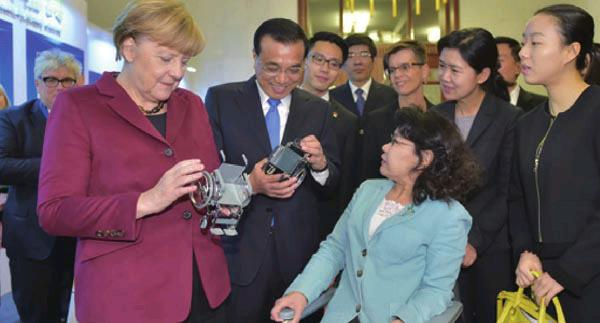A Model for China-EU Relations
2015-12-01ByLanXinzhen
By+Lan+Xinzhen
German Chancellor Angela Merkel is both a well-known and well-liked foreign political figure in China. A household name, many Chinese people have respect for her countrys economic collaboration and partnership with China.
Merkel has also become a bit of a household legend. She once famously told Nigerian President Goodluck Jonathan that she likes to cook and makes her husband breakfast in the mornings.
She had merely been making small talk with her colleagues, Der Spiegel reported, but that story made its way to China. Many Chinese men now cite Merkels gastronomic prowess, even while she is arguably the worlds most influential woman, as they try to convince their wives to prepare breakfast for them before heading to work.
Luckily, Merkels popularity among Chinese people goes beyond her culinary skills. A frequent visitor to China, Merkel once again paid an official visit on October 29-30, her eighth in the past decade as chancellor. The items on the agenda for her recent meetings with Chinese President Xi Jinping were substantive and conversation topics went well beyond mealtime.
Pragmatic politician
In China, frequent reciprocal visits between friends and relatives are good ways to enhance and strengthen friendships and show respect. Merkel understands this well.
Since the reunification of Germany in 1990, based on the idea of economic cooperation first, China and Germanys economic ties have continually grown, eventually becoming a model for Chinas relations with other Western countries. By the time Merkel came to power in 2005, China and Germany had maintained a close relationship. Merkel paid visits to China in 2006 and 2007, and her 2007 visit was particularly well received by the Chinese public as she chose to stay in a junior instead of a presidential suite when she paid a visit to Nanjing, capital of east Chinas Jiangsu Province.
However, influenced by China-skeptic opinions in the West, Merkel started to change the way she dealt with China. One month after her second trip to China as chancellor, she had a meeting with the Dalai Lama, despite strong opposition from Beijing. Merkel was the first German chancellor to meet with the Dalai Lama, which seriously undermined Sino-German relations. Only when the German foreign ministry made an official commitment to China on related issues in 2008, bilateral relations began to warm up again.
After the setback, Merkel readjusted her China policy to become more pragmatic. Not long after being reelected as chancellor in 2010, Merkel made her fourth trip to China. During the visit, the two countries signed a joint communique to formally set their relations as a strategic partnership, marking a new starting point for bilateral relations. She even visited China twice in 2012 as part of her continued efforts to strengthen the partnership.
On a mission
Soon after Chinese President Xi Jinpings fruitful visit to Britain and the announcement of a “golden era” of China-Britain relations, the German chancellor kicked off her Chinese trip with visible urgency. Some observers commented that the timing of her visit symbolizes competition with the United Kingdom to be Chinas closest European economic and trading partner.
In fact, Merkels visit was motivated by a larger responsibility.
Germany is under pressure to attach more importance to Sino-German economic relations, not merely to outdo its EU colleagues, but to strengthen Germanys economic situation. Germany has been flanked with the eurozone debt crisis, the impact of sanctions on Russia, as well as Volkswagens emission scandal. Increased cooperation between China and Germany therefore is particularly significant for Merkel and her constituents at this time.
Germany already has the closest trade rela- tionship with China in Europe. The two countries not only enjoy significant levels of bilateral trade volume, but their trade structures are highly complementary with each other. According to Chinese Ambassador to Germany Shi Mingde, the trade volume between China and Germany reached $177.8 billion in 2014, accounting for around 30 percent of total China-EU trade volume that same year.
The major products China imports from Germany are automobiles, auto parts, metalworking machines, pharmaceutical products, and integrated circuits. Chinas main exports to Germany include automatic data processing equipment and its components, clothing and accessories, textile yarn and fabrics products.
In fact, China is currently Germanys largest trading partner outside the European Union, while Germany is Chinas largest trading partner as well as the most important source country of technology transfer and investment in Europe. Yet despite already close ties, there is room for improvement.
In reality, both countries have strong intentions to advance their cooperation. In May, China released a roadmap for the future of manufacturing, the Made in China 2025 plan, under which China will focus on the upgrading of the manufacturing sector to improve innovation ability and the development of fully automated “smart” factories, and integrate information technology with industrialization through green manufacturing and manufacturing internationalization.
Made in China 2025 is the first 10-year action plan designed to transform China from a traditional manufacturing power into a leading advanced manufacturing force. The strategy coincides with the Industrie 4.0 plan, a strategy put forward by the German Government to promote computerization in manufacturing. The strategy has also formed a broad base for the deepening of bilateral cooperation with China.
Manufacturing is critical to the economies of both countries, accounting for 40 percent of Chinas and 25 percent of Germanys GDP.
“It is in both countries interests to innovate and to modernize, in order to be more productive and to remain competitive because both of us rely strongly on exports of manufactured goods, more than any other country,” said German Ambassador to China Michael Clauss ahead of Merkels arrival.
Her visit is expected to result in two key economic effects. The first is that it will further promote the quality of the bilateral economic relationship. The second is that it will help expand bilateral cooperation into new fields and deepen cooperation in the areas of new energy, environmental protection as well as finance.
Along with substantive bilateral exchanges, the two countries are also aware that there are still many fields for the two sides to learn from each other as close collaboration and innovation are two ingredients for sustained economic growth.
